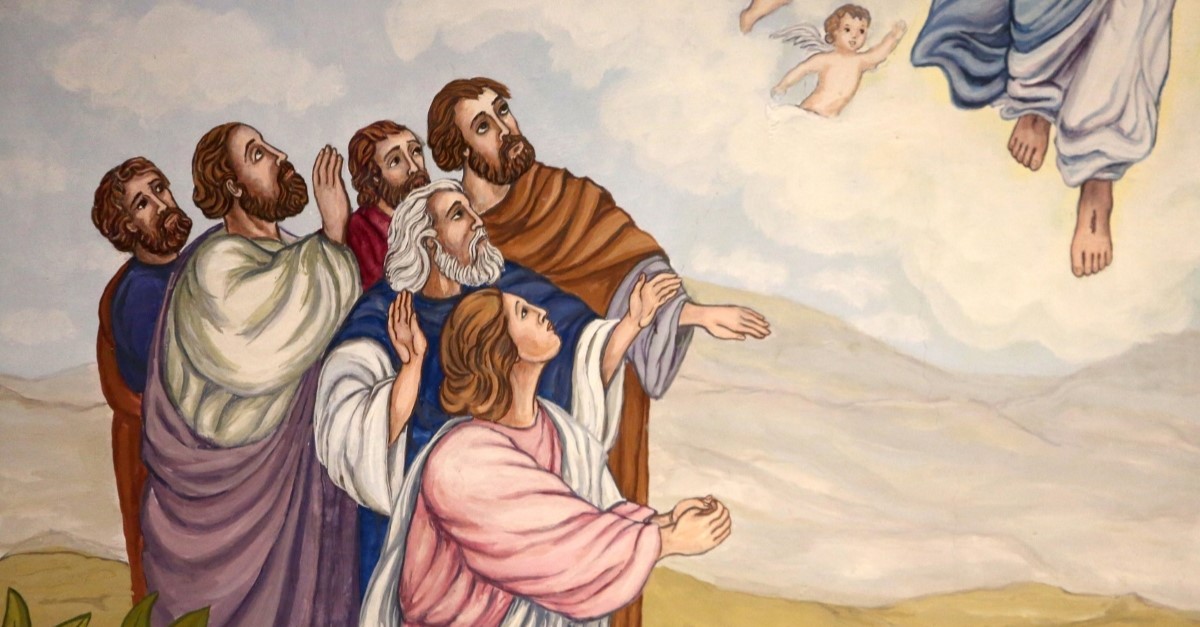
Some verses spark great imagination. Tales of giants and leviathans run through the Old Testament. Even in the New Testament, we find some curious passages that make us wonder and ask seemingly crazy questions. These moments remind us that God’s Word is not only truth, but also rich with depth, beauty, and mystery.
God often speaks in ways that invite us to seek Him more deeply—not always giving clear-cut answers, but always pointing us toward greater trust in His wisdom and purpose.
One such passage recounts an encounter between Jesus and his disciples after his ascension. While Jesus corrects Peter, he suggests John might live until Jesus’ later return. Since Jesus hasn’t returned yet, is the apostle John still alive?
Photo Credit: ©iStock/Getty Images Plus/small smiles

What Bible Verse Makes People Think John is Still Alive Today?
The passage comes from John 21:22-23.
“Jesus said to him, ‘If it is my will that he remain until I come, what is that to you? You follow me!’ So the saying spread abroad among the brothers that this disciple was not to die; yet Jesus did not say to him that he was not to die, but, ‘If it is my will that he remain until I come, what is that to you?’”
After his resurrection, Jesus appears to the disciples by the Sea of Galilee. The disciples had gone back to fishing, their old job, and Christ needed to commission them again. Peter had denied Jesus the night before his crucifixion, and during this conversation, the resurrected Jesus restores Peter and calls him to lead and serve the believers. He also prophesies Peter will one day die a martyr (John 21:18-19). Peter, perhaps feeling exposed and called out, points to “the disciple whom Jesus loved”—which we know to be John—and asks, “Lord, what about this man?”
Jesus then replies with, “If it is my will that he remain until I come, what is that to you?” Such a response led people to think John wouldn’t die before Christ returned. John himself clarifies the statement so there’s no misunderstanding that Jesus didn’t specifically say John wouldn’t die, only that Peter shouldn’t be concerned.
However, people in the early church thought John might live until Jesus returned. When we remember the context of the early church, it might not be so crazy. Many first-century disciples witnessed a resurrected Jesus and his ascension. They saw more supernatural evidence through the Book of Acts. The early church even struggled with the idea of death since Jesus promised eternal life and the end of death for those who believed. Many thought Jesus would come back within decades, not centuries. Even further, John did live longer than the other apostles.
As we read, John himself counters the argument, but it persists.
Photo credit: ©Getty Images/Catherine Leblanc

Do We Have Evidence Regarding the Apostle John’s Death?
We don’t have biblical evidence of John’s death. In the New Testament, John plays a key role in the early church. He and Peter heal a lame man and boldly preach in Jerusalem (Acts 3-4). John goes with Peter to affirm new believers (Acts 8). But after those early chapters in Acts, John doesn’t return to the story. The Bible doesn’t record his later ministry or death.
John returns in the New Testament through three pastoral letters and the important book of Revelation. He had been exiled to the isle of Patmos “because of the word of God and the testimony of Jesus.” (Revelation 1:9) John faced persecution for his faith and evangelism under Roman rule. John continued to be influential to the church, even in his old age.
Early church tradition tells us more of the story. Polycarp (once a disciple of John), Irenaeus, and others wrote that John lived a long life and ministered in Ephesus after he survived his exile on Patmos. Irenaeus says John died during the Roman emperor Trajan’s reign (AD 98-117), probably from natural causes. The rest of the original apostles had been martyred. Tertullian, another early church leader, wrote that John survived being dunked into boiling oil in Rome, which then led to banishment to Patmos.
As we can imagine, if John did survive, these men would have spoken of him as still alive and ministering instead of reporting him dying a natural death in old age.
Photo credit: ©SparrowStock

What Do Scholars Believe about the Passage Indicating John Never Died?
Scholars almost universally agree John 21:21-22 doesn’t predict John’s immortality but rather emphasizes Jesus' correction of Peter. “If it is my will that he remain until I come, what is that to you? Follow me!”
First, Jesus teaches how each disciple has a unique path. Jesus had revealed Peter’s path, and Peter wanted to know about John’s, connecting with other passages suggesting a tension between Peter and John. John had remained close to Jesus through the crucifixion while Peter had denied Christ. Peter wanted to know how difficult John’s path would be. Jesus calls Peter to focus on following him and not worrying about others.
As we discussed earlier, the early church developed some confusion when people started dying natural deaths. Jesus had declared they would have eternal life if they believed. Paul also had to address this misunderstanding. John 21:23 mentions how some early church believers thought John wouldn’t die. Most of these stories had been told several times before they had been written down, and John makes a commentary to clarify the reality. Jesus didn’t say John would live until his return. Christ only used the statement to make a point about simple obedience and refusing comparison with others.
Photo credit: ©GettyImages/rudall30

Does the Bible Mention Any Immortal People?
Interestingly, the early church would have read a Bible, the Old Testament, which would have included stories of righteous men avoiding death.
Genesis 5:24 says, “Enoch walked with God, and he was not, for God took him.” Genesis lists a genealogy where everyone else dies. But the Bible describes Enoch as someone who walked faithfully with God and was simply taken away—to the heavens. In the New Testament, Hebrews 11:5 supports this: “By faith Enoch was taken up so that he should not see death, and he was not found, because God had taken him.” Enoch didn’t experience death but was taken directly into God’s presence. And since much of the early Jewish community would have been influenced by the popular but non-canonical book of Enoch, why not John who literally walked with God in Christ?
Elijah also avoided death, as we see in 2 Kings 2:11. “Elijah went up by a whirlwind to heaven.” God rewarded Elijah’s faithful ministry to the kingdom of Israel by taking him alive into heaven with chariots and horses of fire. Elijah becomes only the second person to be brought to heaven without experiencing death.
Melchizedek becomes another odd figure, the mysterious priest-king of Salem who blesses the great Abraham in Genesis 14, of whom the Old Testament doesn’t record a beginning or an end. Hebrews 7:3 describes him as “without father or mother or genealogy, having neither beginning of days nor end of life, but resembling the Son of God he continues a priest forever.”
Of course, in context, the writer of Hebrews is making a point regarding Christ’s eternal priesthood, showing how a precedent exists. Jesus doesn’t come from Aaron’s physical priesthood lineage but a spiritual one from Melchizedek, a priest-king. It’s unlikely Melchizedek was an immortal figure, but he also sparks discussion and imagination.
With these examples readily available for the early church, why couldn’t John avoid death? Especially as the “disciple Jesus loved?”
Photo credit: ©Thinkstock

What Can We Learn from This Passage about John?
When Jesus asks a hypothetical question in John 21, he corrected Peter, but we can learn lessons from the exchange, as well.
John 21:21 offers a powerful lesson about discipleship, trust, and avoiding comparison.
First, Jesus calls each of us to a personal path, where our only concern is to follow Jesus. Humans love to compare ourselves with others, but this leads to division and competition, not godliness. Jesus redirects Peter, essentially telling him, “Don’t worry about John—focus on your own.” It’s difficult enough for us to follow God for ourselves; we don’t need to add worrying about others in this way. Comparison becomes prideful or jealous. Christ alone is our singular focus.
Second, while John died a natural death, he may have seen Jesus’ return before he did. Jesus’ words could refer to John’s later vision of Christ’s return in Revelation. John didn’t live until the literal second coming, but he did experience a powerful vision of it while on Patmos, after he likely survived being boiled in oil. In one sense, John did “see” the return of Jesus, only in a prophetic way.
Third, we should refrain from judging another person’s walk or calling based on limited information. When we don’t fully understand someone’s relationship with God or their calling, we must resist drawing conclusions, especially since there’s much of their life we don’t know. Jesus reminds us through correcting Peter how some things belong only to God’s will, and we aren’t to judge another man’s (God’s) servant.
Jesus’ statement doesn’t mean John still lives today, but he does mean to teach us all how to live and treat one another in love and without comparison.
Photo credit: ©GettyImages/Zbynek Pospisil

Originally published Monday, 14 April 2025.
